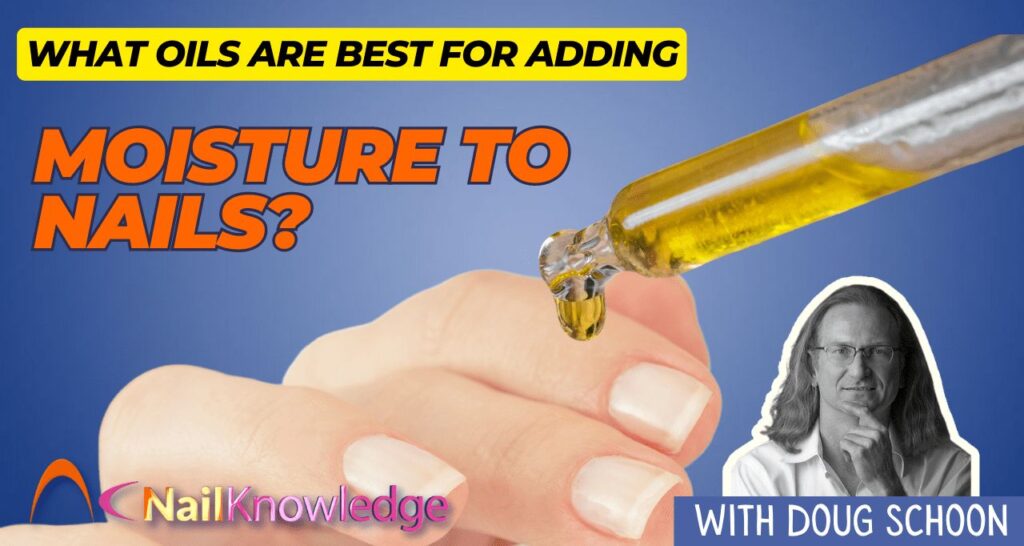Além disso, óleos diferentes são melhores para o cabelo ou para a pele?
Moisturizers are misunderstood. Contrary to what some may believe, oils can’t add any moisture to nails, skin or hair, but they can prevent “dryness”, so this causes some confusion.
O papel da hidratação e da concentração de água
When moisturizing is added, that increases “water” concentration inside nails, skin or hair. As you probably already know, water and oil don’t mix.
Natureza anidra de óleos cosméticos e emulsificantes
The water content of any cosmetic oil is nearly zero. They are considered “anhydrous” or “without water”. Oils and water can exist together in a cosmetic lotion or cream, but only if they are mixed with a special type of ingredient called an “emulsifier”. Emulsifiers are used to create many types of oil and water blends. Many foods, such as salad dressings, mayonnaise and ice cream are all made possible by emulsifiers and without them, these ingredients would quickly separate.
Teor de umidade e cremes/loções
Os cremes e loções podem aumentar o teor de umidade das unhas, da pele ou dos cabelos porque contêm quantidades significativas de água como ingrediente. Os óleos por si só também podem aumentar a umidade content of nails and skin, but they do this in a different way than many understand. Oils coat the nails and skin with a thin film that forms a moisture resistant barrier.
Óleos e seu impacto no teor de umidade
Some oils can penetrate and will create a barrier in the upper layers of the skin. Underneath this barrier, moisture can build up, thus raising the water content of nails or skin, but not for hair. Why? A steady supply of water travels from the nail bed to the nail plate surface, just as it does from the dermis to the skin’s outer surface.
Migração de água e TEWL
This water migration is slowed down by oils. Water migration through the epidermis is called “trans-epidermal water loss” or TEWL. Cosmetic scientists use special instruments to measure the TEWL to determine the effectiveness of skin lotions, creams and oils. Lower water loss (less water escaping from the skin) means a product is a more effective moisturizer.
Oils’ Effects on Nails, Skin, and Hair
This type of water migration doesn’t occur in a shaft of hair, so oils can’t moisturize the hair. Some oils provide additional benefits by increasing the flexibility in nails, skin or hair. As I explained in a previous question, nail oils add lubrication which allows the various layers to slide across each other, increasing flexibility. Oils also soften each of these to make their surfaces less hard. Some don’t penetrate at all, and remain on top of the skin. Those that sit on top of the skin are called “occlusive agents”.
Agentes oclusivos e retenção de umidade
That term may sound like something out of a spy thriller, but the word “occlude” simply means “to block” or “obstruct”. Mineral oil is an “occlusive agent” which means it doesn’t penetrate; instead, it will sit on the skin to create a barrier that slows or blocks moisture evaporation.
Os óleos de silicone também podem ser agentes oclusivos.
Aumento da umidade e preenchimento da pele
The same type of moisture build-up would occur if you wrapped the skin in plastic wraps that keep foods fresh in the refrigerator. Occluding the skin causes moisture build-up, but we wouldn’t think of these plastic wraps as a skin moisturizer, even though they increase the level of moisture in the skin.
O aumento do teor de água também pode suavizar e melhorar a flexibilidade da pele, além de causar o seu preenchimento. Obviamente, o mesmo acontece na placa ungueal, mas em um grau menor, e o inverso também ocorre.
Óleos e bloqueio Penetração excessiva de água
Os óleos também podem bloquear a penetração de quantidades excessivas de água do exterior nas unhas, nos cabelos ou na pele e evitar que fiquem saturados demais com moléculas de água.
Conclusão
Entender o papel dos óleos na hidratação é fundamental para manter unhas, pele e cabelos saudáveis. Embora os óleos em si não possam adicionar umidade, eles desempenham um papel importante na prevenção do ressecamento ao criar uma barreira protetora. Os óleos diferem em sua capacidade de penetrar e criar barreiras, sendo que alguns óleos oferecem benefícios adicionais, como maior flexibilidade.
It’s important to note that water and oil do not mix, and the water content of cosmetic oils is minimal. Creams and lotions, on the other hand, contain significant amounts of water, making them effective at increasing moisture content.
Furthermore, the concept of occlusive agents, such as mineral oil and silicone oils, should be understood. These agents form a barrier on the skin’s surface, slowing down moisture evaporation and enhancing softness and plumping effects. However, they should not be mistaken for traditional moisturizers.
Ao compreender as distinções entre óleos, cremes e agentes oclusivos, podemos fazer escolhas informadas sobre os melhores produtos para apoiar a saúde das unhas, da pele e dos cabelos. Lembre-se de levar em conta as propriedades exclusivas de cada um e escolher de acordo para manter os níveis ideais de hidratação e o bem-estar geral.
Perguntas frequentes
- Os óleos podem adicionar umidade às unhas, à pele ou ao cabelo?
Não, os óleos não podem adicionar umidade às unhas, à pele ou ao cabelo. Entretanto, eles podem evitar o ressecamento formando uma barreira que retém a umidade. - Os diferentes óleos podem ter efeitos diferentes na pele em comparação com o cabelo?
Sim, diferentes óleos podem ter efeitos diferentes na pele em comparação com o cabelo. Embora os óleos possam aumentar o teor de umidade e proporcionar benefícios para as unhas e a pele, eles não têm o mesmo efeito hidratante nos cabelos. - O que são agentes oclusivos e como eles afetam a retenção de umidade?
Occlusive agents are substances that create a barrier on the skin’s surface, preventing moisture evaporation. Examples include mineral oil and silicone oils. They can help retain moisture and improve skin flexibility, but they should not be confused with traditional skin moisturizers.


